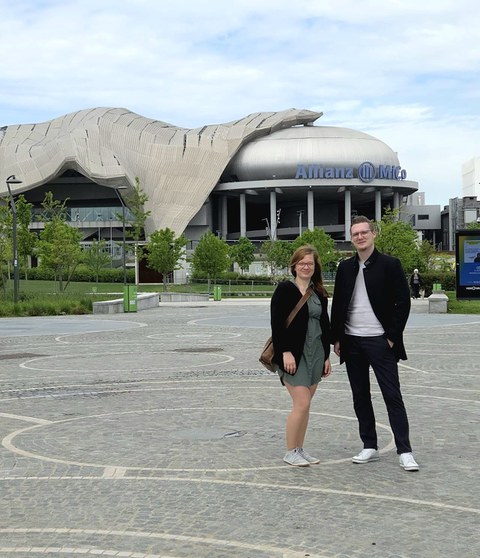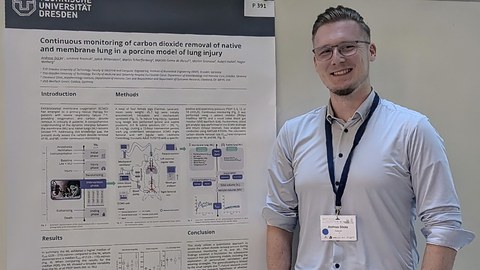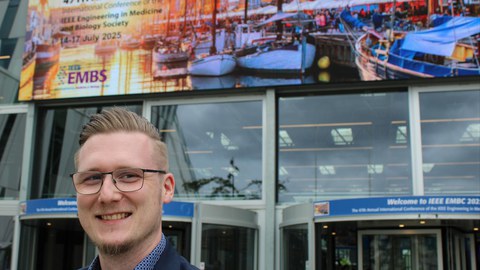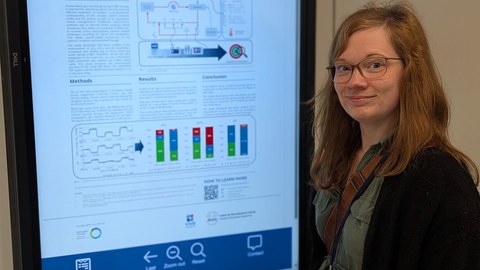Arbeitsgruppe Perfusionstechnik
Inhaltsverzeichnis
Überblick
Die Arbeitsgruppe befasst sich mit anwendungsorientierter Forschung auf dem Gebiet der extrakorporalen Perfusion, um eine Verbesserung heute verfügbarer technischer Lösungen zu ermöglichen.
Schwerpunkte der Arbeitsgruppe sind Geräte- und Verfahrensentwicklungen für die Transplantationsmedizin sowie für die extrakorporalen Lebensunterstützungssysteme (ECLS). Die Forschungs- und Entwicklungsarbeiten umfassen sowohl Entwurf, Modellierung und Simulation, Konstruktion und Prototypenbau als auch experimentelle Validierung und Testung von Komponenten und Anlagen der Perfusionstechnik. Die Arbeiten basieren auf einer engen interdisziplinären Verknüpfung von Ingenieur- und Naturwissenschaften mit medizinischen Disziplinen. In nationalen und internationalen interdisziplinären Kooperationen mit Kliniken, Industrie und Forschungseinrichtungen werden gemeinsame Forschungsprojekte konzipiert und realisiert.
Die Verbindung von aktueller Forschung mit der Lehre ist für uns wichtig. Studierende unterschiedlicher Fachgebiete finden für Projekt- und Abschlussarbeiten ein breites Themenspektrum.
Mitarbeit
Interessenten haben jederzeit im Rahmen von Projekt-, Studien-, Diplom- und Masterarbeiten oder über Beschäftigung als WHK/SHK die Möglichkeit zur Mitarbeit an Forschungsthemen der Arbeitsgruppe.
Konkrete Anfragen richten Sie an die Arbeitsgruppenleitung (Kontakt siehe unten).
Wir suchen zum nächstmöglichen Zeitpunkt eine Projektmitarbeiterin bzw. einen Projektmitarbeiter (BMWE gefördertes ZIM-Projekt PevO-3D) für unsere Arbeitsgruppe am Institut für Biomedizinische Technik.
Nähere Informationen:
Für das aktuelle Semester wird eine stud. Hilfskraft (10 h/Woche) für die Unterstützung der Lehre und der Mitarbeit in Forschungstätigkeiten der Arbeitsgruppe gesucht. Der Arbeitsumfang beträgt 10 Stunden/Woche, dies kann aber variabel gestaltet werden. Die Beschäftigungsdauer richtet sich nach dem WissZeitVG.
Aufgaben:
- Unterstützung bei der Vorbereitung und Durchführung von Tests an medizinschen Geräten
- Unterstützung bei der Vorbereitung und Durchführung von Experimenten
- Konstruktion von Zubehör für Messplätze
- Bearbeitung von 3D-Druckaufträgen.
Voraussetzungen:
- Immatrikulation an einer Hochschule
- Kenntnisse in CAD (vorzugsweise Inventor)
- Interesse an Arbeiten im medizinischen Umfeld
- sehr gute Kenntnisse der deutschen Sprache.
Bitte reichen Sie Ihre Bewerbungsunterlagen mit Lebenslauf und aktueller Notenübersicht per E-Mail an:
Frau Dr.-Ing. Susanne Kromnik
susanne.kromnik@tu-dresden.de
Bei Interesse an Oberseminaren in unseren Themengebieten, melden Sie sich gerne bei uns!
In folgenden Themenschwerpunkten ist eine Arbeit möglich:
- Themengebiet ECMO-Anwendungen
Die Unterstützung mit extrakorporaler Membranoxygenierung erfolgt als Rescue-Verfahren, wenn die Versorgung über die Lunge mittels invasiver Beatmung nicht mehr gewährleistet werden kann. Die ECMO-Therapie reicht von einer Anwendung weniger Stunden bis hin zu mehreren Wochen. Entscheidendes Element der ECMO ist der Oxygenator. Hier erfolgt die Anreicherung mit Sauerstoff und die Eliminierung von Kohlenstoffdioxid aus dem Blut. Die Funktionalität dieser Komponente im ECMO-System ist von entscheidender Bedeutung. - Themengebiet 3D-Druck für die Medizintechnik
Die additive Fertigung von Bauteilen ist ein schnelles und kostengünstiges Verfahren für die Fertigung von Kleinstserien. Auch im Bereich der Medizintechnik wird dieses Verfahren immer häufiger eingesetzt. - Themengebiet Niere, Nierenperfusion und Organersatztherapie
Der Ausfall der Niere kann durch verschiedene technische Verfahren kompensiert werden. Dabei ist die Nierentransplantation das einzig kurative Verfahren. Spendermangel und demografischer Wandel haben direkten Einfluss auf die Anzahl und Qualität gespendeter Organe. In der Forschung gibt es verschiedene technische Möglichkeiten, die Qualität der Organe zu erhalten bzw. zu verbessern.
Individuelle Themenvorschläge zu aktuellen Themen der Arbeitsgruppe sind jederzeit möglich.
Themenvorschläge für Studien-und Diplomarbeiten sind u. a.:
- Entwicklung von Gerätekomponenten und Regelungsstrategien für die extrakorporale Membranoxygenierung (ECMO)
- Konzeptionierung einer Bewertung des Oxygenators in der ECMO-Anwendung
- Entwicklung von Gerätekonzepten für die ex vivo Organperfusion
- Konzepte für die Integration von Sensoren in eine Organlagerung
- Weiterentwicklung der Steuersoftware und Benutzerschnittstelle eines Organperfusionssystems
- Entwicklung einer kontrollierten Durchströmung von Spendernieren in der NMP
-
Auswertung von bestehenden Datensätzen (Blutdaten, Perfusionsdaten, Bilddaten) hinsichtlich bestehender Standards
-
Weiterentwicklung von bestehenden Topologiekonzepten hinsichtlich einer optimierten Usablility
- Forschung im Bereich 3D-Druck für die Medizintechnik
- Konzeptionierung von In-Prozess-Qualitätssicherungsmethoden für den 3D-Druck
- Optimierung und Modularisierung eines bestehenden Silikon-3D-Drucksystems
- Untersuchung der Sauerstoffanreicherung in Luftfahrzeugen während High-Flow-Sauerstofftherapien
- Droplet-basierte Formgebung von bioaktiven Mikrokugeln für das Tissue Engineering
(Thema in Kooperation mit dem FILK in Freiberg)
Unsere Partner bieten die nachfolgenden Themen oder Stellen:
VIVE-Medtech
Pulmonary Engineering Group, Klinik und Poliklinik für Anästhesie und Intensivmedizin, Medizinische Fakultät Carl Gustav Carus
- Identifikation rekrutierbarer Areale im Thorax-Computertomogram mittels Tiefen Neuronalen Netzen
- Modellierung überbelüfteten Lungengewebes und Bestimmung von Lungenvolumina im Computertomogram
- Vergleichende Modellierung der nicht-linearen respiratorischen Mechanik hinsichtlich der Abhängigkeit vom Atemwegsfluss
Forschungsschwerpunkte
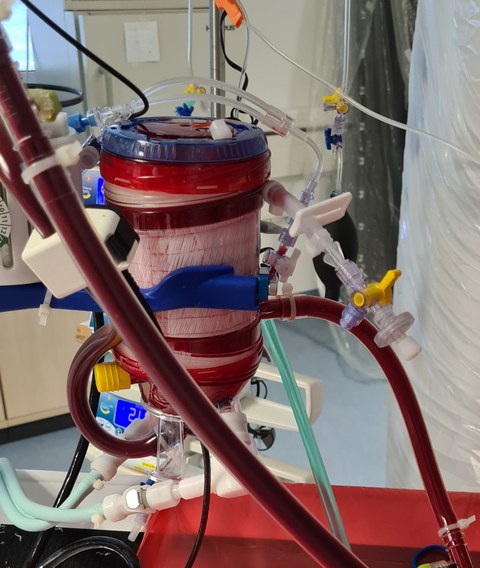
Oxygenator im ECMO-Kreislauf
Im Mittelpunkt unserer Arbeit steht die technische Weiterentwicklung der ECMO-Therapie (extrakorporale Membranoxygenierung). Dabei wird das Blut des Patienten außerhalb des Körpers mit Hilfe eines Oxygenators mit Sauerstoff angereichert. Durch den Einsatz kontinuierlich messender Sensoren erhalten wir Daten über die Lungenfunktion und den ECMO-Kreislauf. Diese Informationen ermöglichen es, den Verlauf der Therapie zu überwachen und die Behandlung gezielter und sicherer zu steuern. Unser Ziel ist es, die ECMO-Therapie mit Hilfe innovativer Technologien effektiver und patientenfreundlicher zu gestalten.
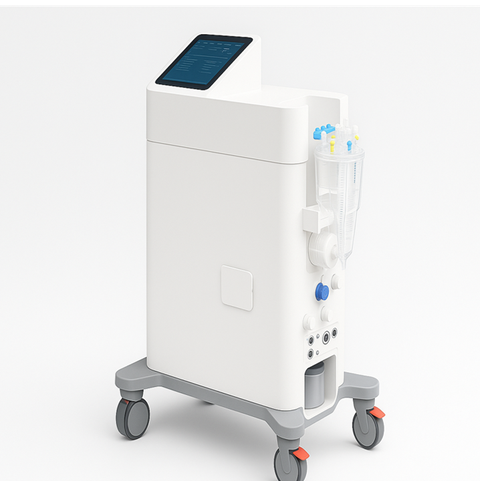
Konzeptbild eines Nierenperfusionssystems
Wir entwickeln technische Lösungen zur normothermen Nierenperfusion – einem Verfahren, bei dem Spendernieren vor der Transplantation bei Körpertemperatur mit einem Medium (in der Regel Blut oder Blutbestandteile) durchströmt werden.
Ziel ist es, die Organqualität außerhalb des Körpers zu beurteilen. Dafür kombinieren wir moderne Gerätetechnik mit intelligenten Bewertungsalgorithmen, um die Funktionalität der Nieren präzise und objektiv einzuschätzen. So tragen wir dazu bei, die Transplantationsmedizin sicherer und erfolgreicher zu gestalten.
Im Rahmen des Projektes ASYS-Transplant entwickelte die Arbeitsgruppe ein Assistenzsystems für die Funktionsbewertung von
Spendernieren in der Transplantationsmedizin. Dabei wurden die folgenden Projektziele verfolgt:
- die Entwicklung eines medizinproduktekonformen Prototyps für die normotherme Vollblutperfusion von Nieren
- die Entwicklung von Algorithmen für eine objektive Bewertung der Organqualität vor der Transplantation anhand eines Scoringsystems
Die Anwendung verschiedener Beatmungsmodi gewinnt beim Transport kritisch kranker Patienten per Helikopter zunehmend an Bedeutung. Gleichzeitig birgt der Einsatz hoher Sauerstoffmengen – etwa bei der High-Flow-Therapie – ein erhöhtes Risiko für Brand- und Explosionsgefahr. Mithilfe moderner Messtechnik und Modellierung untersuchen wir die Sauerstoffanreicherung in der Helikopterkabine und können Rückschlüsse auf die Patienten- und Anwendersicherheit geben.
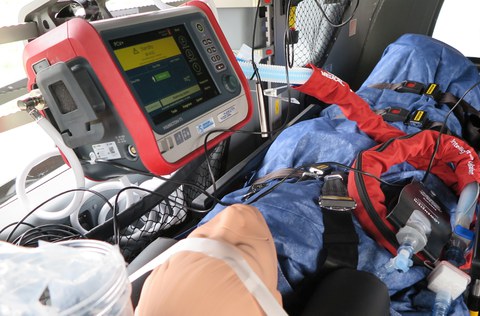
Testsetup für Untersuchungen im Helikopter
Forschungsleistungen im Überblick
Wir unterstützen Sie gern bei der Durchführung spezifischer Versuchsreihen, Machbarkeitsstudien oder Validierungsprozesse im Rahmen von Forschungs- und Entwicklungsprojekten. Einige ausgewählte Forschungsleisungen finden Sie hier:
Partner
Für medizintechnische Innovationen zur Lösung komplexer medizinischer Fragestellungen ist eine enge multidisziplinäre Zusammenarbeit zwischen Ingenieuren, Naturwissenschaftlern und Ärzten unbedingt erforderlich. Nur so lassen sich aus den Ergebnissen der lebenswissenschaftlichen Grundlagenforschung bzw. klinisch-patientenorientierten Forschung neue Verfahren oder Produkte bis hin zur Marktreife entwickeln. Aus diesem Grund bestehen enge Kontakte sowohl zu klinischen Partnern, u.a. Arbeitsgruppe Pulmonary Engineering Group (PEG) und Klinik und Poliklinik für Urologie als auch zu wirtschaftlichen Partnern VIVE-MedTech GmbH.
Forschende
 © IBMT
© IBMT
Arbeitsgruppenleiterin
NameFrau Dr.-Ing. Susanne Kromnik
AG Perfusionstechnik
Eine verschlüsselte E-Mail über das SecureMail-Portal versenden (nur für TUD-externe Personen).
Besucheradresse:
Fetscherforum (F29), 1. OG, Raum 36 Fetscherstr. 29
01307 Dresden
None
Doktorand
NameHerr Andreas Döcke M. Sc.
AG Perfusionstechnik
Eine verschlüsselte E-Mail über das SecureMail-Portal versenden (nur für TUD-externe Personen).
Besucheradresse:
Fetscherforum (29), 1.OG, Raum 35 Fetscherstr. 29
01307 Dresden
None
Veröffentlichungen
2025
-
Contribution of Extracorporeal Membrane Oxygenation to Overall Gas Exchange in a Porcine Model of Lung Injury*, 3 Dez. 2025, 2025 47th Annual International Conference of the IEEE Engineering in Medicine and Biology Society (EMBC). Institute of Electrical and Electronics Engineers (IEEE), Band 2025. S. 1-6, 6 S., 11253862Elektronische (Volltext-)VersionPublikation: Beitrag in Buch/Konferenzbericht/Sammelband/Gutachten > Beitrag in Konferenzband
-
Continuous monitoring of carbon dioxide removal of native and membrane lung in a porcine model of lung injury, 1 Sept. 2025, in: Biomedical engineering : joint journal of the German Society for Biomedical Engineering in VDE and the Austrian and Swiss Societies for Biomedical Engineering. 70, s1, S. 257-257, 1 S., 391Elektronische (Volltext-)VersionPublikation: Beitrag in Fachzeitschrift > Meeting Abstract
-
Comparison of the VIVE In-Line Monitor (ILM) and the Terumo CDI 500 with the Radiometer ABL80 FLEX, 22 April 2025, in: Perfusion : the leading journal in the field of extra-corporeal circulation. 40, Suppl 1, S. 67S - 291S, 1 S., 92Elektronische (Volltext-)VersionPublikation: Beitrag in Fachzeitschrift > Meeting Abstract
2024
-
Investigation of oxygen enrichment in rescue helicopters due to mechanical ventilation, 1 Dez. 2024, in: Biomedical engineering : joint journal of the German Society for Biomedical Engineering in VDE and the Austrian and Swiss Societies for Biomedical Engineering. 69, s2, S. 29, 1 S.Elektronische (Volltext-)VersionPublikation: Beitrag in Fachzeitschrift > Meeting Abstract
-
In vitro test setup for continuous evaluation of oxygenators for extracorporeal circulation, Dez. 2024, AUTOMED 2024 Proceedings: Advances in Automation and Control in Medical Technology. S. 37-38, 2 S., 19Elektronische (Volltext-)VersionPublikation: Beitrag in Buch/Konferenzbericht/Sammelband/Gutachten > Beitrag in Konferenzband
-
Assessing Biomarkers of Porcine Kidneys under Normothermic Machine Perfusion - Can We Gain Insight into a Marginal Organ?, 24 Sept. 2024, in: International Journal of Molecular Sciences. 25 (2024), 19, 15 S., 10280Elektronische (Volltext-)VersionPublikation: Beitrag in Fachzeitschrift > Forschungsartikel
-
Assessment of hemodynamic and blood parameters that may reflect macroscopic quality of porcine kidneys during normothermic machine perfusion using whole blood, 7 Aug. 2024, in: World journal of urology. 42 (2024), 1, 8 S., 471Elektronische (Volltext-)VersionPublikation: Beitrag in Fachzeitschrift > Forschungsartikel
-
Assessment of kidney graft quality during normothermic machine perfusion using NMR spectroscopy as a valuable tool, 5 März 2024, European Urology: Abstracts EAU24 - 39th Annual EAU Congress. Supplement 1 Aufl., Elsevier Science B.V., Band 85. S. S2000-S2000, 1 S., A0937Elektronische (Volltext-)VersionPublikation: Beitrag in Buch/Konferenzbericht/Sammelband/Gutachten > Beitrag in Konferenzband
2023
-
Characterization of time-delay in inline blood gas sensors, 8 Sept. 2023, in: Biomedical engineering : joint journal of the German Society for Biomedical Engineering in VDE and the Austrian and Swiss Societies for Biomedical Engineering. 68, s1, S. 214-214, 1 S.Elektronische (Volltext-)VersionPublikation: Beitrag in Fachzeitschrift > Meeting Abstract
-
Klinische Bewertung von normotherm perfundierten Schweinenieren mit autologem Vollblut, 25 Aug. 2023, Die Urologie: Abstracts des 75. Kongresses der Deutschen Gesellschaft für Urologie e. V.. Springer Medizin Verlag GmbH, Band 62. S. S39-S40, 1 S., V05-06Elektronische (Volltext-)VersionPublikation: Beitrag in Buch/Konferenzbericht/Sammelband/Gutachten > Beitrag in Konferenzband

